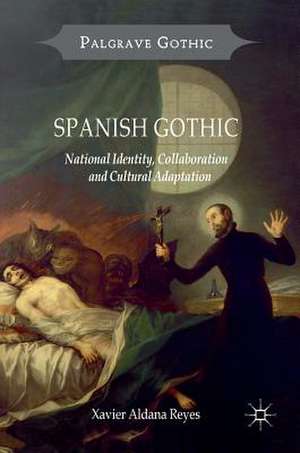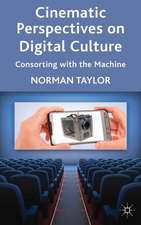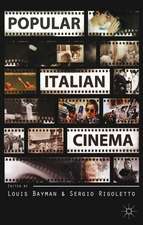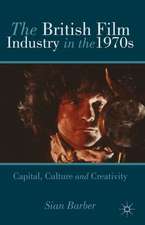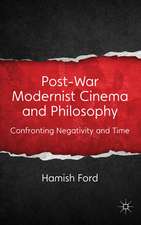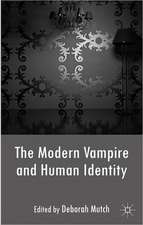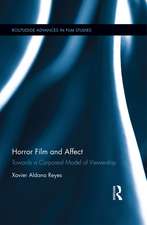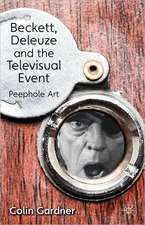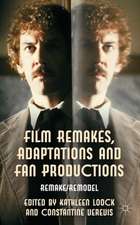Spanish Gothic: National Identity, Collaboration and Cultural Adaptation: Palgrave Gothic
Autor Xavier Aldana Reyesen Limba Engleză Hardback – 27 mar 2017
This book presents the first English introduction to the broad history of the Gothic mode in Spain. It focuses on key literary periods, such as Romanticism, the fin-de-siècle, spiritualist writings of the early-twentieth century, and the cinematic and literary booms of the 1970s and 2000s. With illustrative case studies, Aldana Reyes demonstrates how the Gothic mode has been a permanent yet ever-shifting fixture of the literary and cinematic landscape of Spain since the late-eighteenth century. He proposes that writers and filmmakers alike welcomed the Gothic as a liberating and transgressive artistic language.
Din seria Palgrave Gothic
- 9%
 Preț: 751.77 lei
Preț: 751.77 lei - 20%
 Preț: 626.82 lei
Preț: 626.82 lei -
 Preț: 280.08 lei
Preț: 280.08 lei -
 Preț: 351.66 lei
Preț: 351.66 lei - 20%
 Preț: 690.54 lei
Preț: 690.54 lei - 15%
 Preț: 584.10 lei
Preț: 584.10 lei - 18%
 Preț: 782.24 lei
Preț: 782.24 lei - 15%
 Preț: 694.22 lei
Preț: 694.22 lei - 15%
 Preț: 690.76 lei
Preț: 690.76 lei - 15%
 Preț: 586.88 lei
Preț: 586.88 lei -
 Preț: 210.55 lei
Preț: 210.55 lei -
 Preț: 351.11 lei
Preț: 351.11 lei - 18%
 Preț: 778.01 lei
Preț: 778.01 lei -
 Preț: 262.29 lei
Preț: 262.29 lei - 15%
 Preț: 635.12 lei
Preț: 635.12 lei - 15%
 Preț: 640.24 lei
Preț: 640.24 lei - 18%
 Preț: 893.21 lei
Preț: 893.21 lei - 18%
 Preț: 733.65 lei
Preț: 733.65 lei -
 Preț: 231.01 lei
Preț: 231.01 lei -
 Preț: 233.35 lei
Preț: 233.35 lei -
 Preț: 190.32 lei
Preț: 190.32 lei - 18%
 Preț: 898.26 lei
Preț: 898.26 lei -
 Preț: 387.38 lei
Preț: 387.38 lei - 15%
 Preț: 704.04 lei
Preț: 704.04 lei - 15%
 Preț: 640.88 lei
Preț: 640.88 lei - 18%
 Preț: 724.32 lei
Preț: 724.32 lei - 18%
 Preț: 788.41 lei
Preț: 788.41 lei - 18%
 Preț: 731.59 lei
Preț: 731.59 lei -
 Preț: 389.70 lei
Preț: 389.70 lei - 18%
 Preț: 731.91 lei
Preț: 731.91 lei -
 Preț: 232.16 lei
Preț: 232.16 lei - 15%
 Preț: 586.05 lei
Preț: 586.05 lei
Preț: 698.15 lei
Preț vechi: 821.35 lei
-15% Nou
Puncte Express: 1047
Preț estimativ în valută:
133.58€ • 139.49$ • 110.31£
133.58€ • 139.49$ • 110.31£
Carte tipărită la comandă
Livrare economică 15-29 aprilie
Preluare comenzi: 021 569.72.76
Specificații
ISBN-13: 9781137306005
ISBN-10: 1137306009
Pagini: 241
Ilustrații: X, 241 p.
Dimensiuni: 148 x 210 x 16 mm
Greutate: 0.45 kg
Ediția:1st ed. 2017
Editura: Palgrave Macmillan UK
Colecția Palgrave Macmillan
Seria Palgrave Gothic
Locul publicării:London, United Kingdom
ISBN-10: 1137306009
Pagini: 241
Ilustrații: X, 241 p.
Dimensiuni: 148 x 210 x 16 mm
Greutate: 0.45 kg
Ediția:1st ed. 2017
Editura: Palgrave Macmillan UK
Colecția Palgrave Macmillan
Seria Palgrave Gothic
Locul publicării:London, United Kingdom
Cuprins
1. INTRODUCTION: DEFINING AND DELIMITING THE SPANISH GOTHIC.- 2. PART I - FIRST WAVE GOTHIC (1785–1834) - Chapter 1. Imported Terrors and First Genre Hybrids.- 3. Chapter 2. The Early Spanish Gothic Novel (1800–34).- 4. PART II - FROM ROMANTICISM TO THE FIN-DE-SIÈCLE (1834–1900) - Chapter 3. Spanish Romanticism and the Gothic.- 5. Chapter 4. From the 1860s to the Fin-de-Siècle: The Development of the Gothic Short Story.- 6. PART III - MODERN AND CONTEMPORARY GOTHIC LITERATURE (1900–2016) - Chapter 5. The Twentieth Century (1900–75): Modernist Spiritualism and Political Gothic.- 7. Chapter 6. From the Death of Franco to the Present: The Establishment of Horror and the Gothic Auteur.- 8. PART IV - SPANISH GOTHIC CINEMA (1906–2016) - Chapter 7. From Segundo de Chomón to the Rise and Fall of ‘Fantaterror’.- 9. Chapter 8. The Post-Millennial Horror Revival: Auteurs, Gothic (Dis)Continuities and National History.- 10. Conclusion: A Language of Collaboration and Liberation.
Recenzii
“Spanish Gothic is a valuable and revealing introduction to an exotic locale whose sun-drenched vistas would make it an unlikely place for gothic gloom, and yet Aldana Reyes shows how and why it has prospered even there.” (Dejan Ognjanovic, Rue Morgue, Vol.178, September-October, 2017)
“Spanish Gothic is an exemplary piece of scholarship that will assuredly become the cornerstone of future studies of gothic cultural production in Spain. It will, moreover, undoubtedly contribute to new transnational histories of gothic as it developed on a global scale from the eighteenth century to today.” (Christina Morin, The Irish Journal of Gothic and Horror Studies, Vol. 16, 2017)
Notă biografică
Dr Xavier Aldana Reyes is Senior Lecturer in English Literature and Film at Manchester Metropolitan University, UK, and a founding member of the Manchester Centre for Gothic Studies. His books include Horror: A Literary History (editor; 2016), Horror Film and Affect (2016), Digital Horror (co-editor; 2015) and Body Gothic (2014).
Textul de pe ultima copertă
This book presents the first English introduction to the broad history of the Gothic mode in Spain. It focuses on key literary periods, such as Romanticism, the fin-de-siècle, spiritualist writings of the early-twentieth century, and the cinematic and literary booms of the 1970s and 2000s. With illustrative case studies, Aldana Reyes demonstrates how the Gothic mode has been a permanent yet ever-shifting fixture of the literary and cinematic landscape of Spain since the late-eighteenth century. He proposes that writers and filmmakers alike welcomed the Gothic as a liberating and transgressive artistic language.
Caracteristici
First thorough introduction to the history of the Gothic in Spain from the late-eighteenth century to the present day and first in the English language. Advances nation-specific understandings of the Gothic and sets out the intrinsic identity of the Spanish Gothic. The book has a multidisciplinary outlook, focusing on fiction and cinema.
